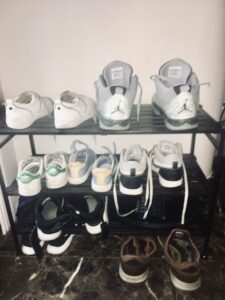Hello to all our at-home readers out there: we're here to talk about going barefoot. Did you use the COVID shut downs to switch to a more 'casual' (read sweats-only) wardrobe? Great, we're totally here for it. But are you padding around your house barefoot all day? That, we actually can't endorse. Because here's the thing: going barefoot all day is really bad for your feet, as I'm sure you'll hear podiatrists tell you. And, as it turns out, it's not that great for your vein health either. Let's take a closer look, so we can convince you to wear some shoes. At least a few hours every day...heck, maybe you'll even go out and take a walk in them! 
In typical times, we're usually home for no more than a few hours every day. So, if you stick to bare feet in the house, it's not a big deal. But these days? For the most part, you're stuck in the house for so many, many hours. Which means, if you remain barefoot, you're putting tons of pressure on your legs and feet. Especially if your home has stone or wood flooring.
As the days and weeks of quarantine add up, that pressure will likely give you plenty of foot pain. And it may also affect circulation to your lower legs and feet, resulting in more swelling (edema) or the emergence or worsening of varicose veins. Now, we can certainly help you with those issues if you're already experiencing discomfort. But we'd rather stop the problem before it starts. In order to do that, this is what you've got to do.
We know that many readers prefer a shoe-free home. This is, after all, a great way to keep germs out of your house. Yet, as we just mentioned, going barefoot all day is a major problem for your feet and your veins. What then, do we propose? It's actually very simple: pick a pair of supportive shoes that you only wear at home. If they never step outside, they'll never pick up germs, so your house stays clean, and your feet and legs secure much-needed support.
And guess what? You don't even have to wear outdoor shoes in your home. Many pairs of slippers are designed with sufficient arch support to stave off pressure, pain and swelling. And, in combination with any recommended compression socks, these will do a great job protecting your vein health. Which is very important, if you want to avoid long term damage to your veins or arteries. Not to mention conditions such as Peripheral Arterial Disease (PAD.)
If you develop swelling or leg pain after going barefoot, that could spell problems for your arteries, too. How could that be? Well, PAD is a condition that develops when your arteries narrow (atherosclerosis.) But many patients miss or delay a PAD diagnosis. Because it's symptoms (including leg pain, and changes in skin color on your legs) look like other problems.
Other things add to the trouble when it comes to diagnosing PAD. Recently, presenters at the American College of Cardiology's annual conference noticed that there's a research gap when it comes to PAD patients. Already, doctors are trying to close that gap with new studies like the Voyager PAD trial.
But as researcher Mar Bonaca, MD, said, "I think that has to change…The PAD patient is complicated…They are at very high risk of limb events. And the risk there is not the same over time.” He also noted, “We need to understand what therapies do, their risks and benefits in a fragile population, and we need to look at outcomes that are relevant for this population.”
We could not agree more! In our Houston and Dallas area vein clinics, we already make a major difference for PAD patients, by offering treatments such as angioplasty, stenting or atherectomy. But we also want to do our part and educate people about their PAD disease risk. Which is why, for now, we ask you to stop going barefoot. To pay attention to any unusual new symptoms in your legs. And to make an appointmentmake an appointmentmake an appointment with our specialists at the first sign of any changes in the look or appearance of your legs!

Scheduling
Please contact our dedicated specialists to schedule a consultation today.
2024 Texas Endovascular. All rights reserved. Website Design by Healthcare Success